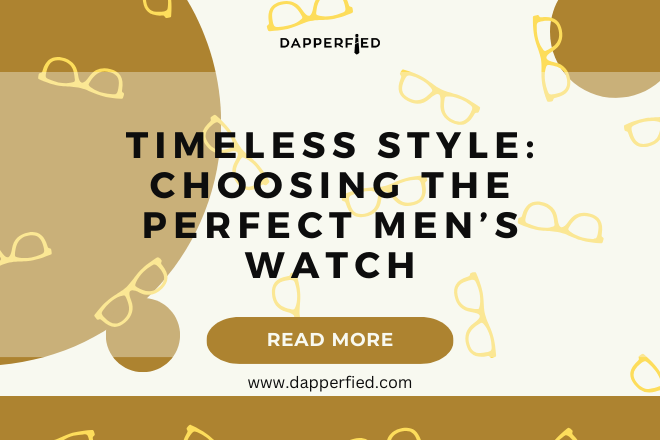
Men's Style
Essential Men’s Watch Features to Consider
When it comes to choosing a watch, water resistance is a crucial factor to consider, especially for those who lead an active lifestyle or enjoy water sports. A watch’s water resistance is measured in meters and indicates the depth to which it can be submerged without sustaining damage. For example, a watch with a water resistance of 30 meters is suitable for everyday use and can withstand splashes or brief immersion in water, while a watch with a water resistance of 100 meters is suitable for swimming and snorkeling. If you’re a diver, you’ll want to look for a watch with a water resistance of at least 200 meters to ensure it can withstand the pressure at greater depths.
In addition to the depth rating, it’s important to consider the type of water resistance a watch offers. Some watches are simply water-resistant, meaning they can withstand minimal exposure to water, while others are specifically designed for diving and are labeled as “diver’s watches.” These watches undergo rigorous testing to ensure they can withstand the high pressures experienced at great depths. When choosing a watch for water activities, it’s essential to look for one that offers the appropriate level of water resistance for your needs and to ensure that it has been tested and certified for its water resistance capabilities.
Key Takeaways
- Water resistance is an important feature to consider when choosing a watch, especially for those who lead an active lifestyle or enjoy water sports.
- The movement type of a watch, whether it’s quartz or mechanical, can greatly impact its accuracy and maintenance needs.
- Material and durability are crucial factors to consider when choosing a watch, as they can affect its longevity and resistance to wear and tear.
- Functionality and features such as chronographs, date displays, and luminous hands can add convenience and practicality to a watch.
- Size and style are important considerations when choosing a watch, as they can impact comfort and how well the watch complements your personal style.
- Brand and reputation can provide insight into the quality and reliability of a watch, as well as its resale value.
- Price and value should be carefully weighed against the features and quality of the watch to ensure a worthwhile investment.
Movement Type
The movement type of a watch refers to the mechanism that powers its timekeeping functions. There are three main types of watch movements: mechanical, automatic, and quartz. Mechanical movements are powered by a mainspring and require regular winding to keep accurate time. These movements are often prized for their craftsmanship and intricate design, making them a popular choice among watch enthusiasts. Automatic movements, on the other hand, are similar to mechanical movements but feature a rotor that winds the mainspring as the wearer moves their wrist, eliminating the need for manual winding. This makes automatic movements more convenient for everyday wear.
Quartz movements, on the other hand, are powered by a battery and are known for their accuracy and low maintenance requirements. While some watch purists may prefer the traditional craftsmanship of mechanical or automatic movements, quartz movements offer practical benefits such as affordability and reliability. When choosing a watch, it’s important to consider the movement type that best suits your lifestyle and preferences. Whether you value the artistry of mechanical movements, the convenience of automatic movements, or the precision of quartz movements, there is a wide range of options available to cater to your needs.
Material and Durability
The material of a watch plays a significant role in its durability and longevity. Common materials used in watchmaking include stainless steel, titanium, ceramic, and precious metals such as gold and platinum. Stainless steel is a popular choice for its durability and resistance to corrosion, making it suitable for everyday wear. Titanium is another durable option that is lighter than stainless steel, making it ideal for those who prefer a lightweight timepiece. Ceramic watches are known for their scratch resistance and hypoallergenic properties, making them an excellent choice for individuals with sensitive skin.
For those seeking luxury and prestige, watches made from precious metals such as gold or platinum offer unparalleled elegance and sophistication. These materials are not only prized for their beauty but also for their durability and resistance to tarnishing. When choosing a watch, it’s important to consider the material that best suits your lifestyle and aesthetic preferences. Whether you prioritize durability, lightweight comfort, or luxurious appeal, there are various materials available to cater to your individual needs.
Functionality and Features
| Functionality and Features | Metrics |
|---|---|
| User Interface | Number of clicks to complete a task |
| Performance | Response time for key actions |
| Compatibility | Number of supported devices/browsers |
| Customization | Options for personalization |
In addition to telling time, many watches offer a range of additional functionalities and features to enhance their utility and appeal. Some common features found in watches include chronographs, moon phase displays, date complications, and GMT functions. Chronographs are popular among individuals who require precise timekeeping for activities such as sports or racing, allowing them to measure elapsed time with precision. Moon phase displays are a romantic and poetic feature that tracks the lunar cycle, adding a touch of whimsy to the watch’s design.
Date complications are practical features that display the current date on the watch dial, eliminating the need to consult a separate calendar. GMT functions are useful for travelers or individuals who frequently communicate with people in different time zones, allowing them to track multiple time zones simultaneously. When choosing a watch, it’s important to consider the functionalities and features that align with your lifestyle and preferences. Whether you value practicality, aesthetics, or technical innovation, there are watches available with a wide range of functionalities to cater to your needs.
Size and Style
The size and style of a watch are important considerations when choosing the perfect timepiece. Watch sizes can vary from small and dainty to large and bold, catering to different wrist sizes and style preferences. The trend for oversized watches has gained popularity in recent years, with many individuals opting for larger timepieces that make a bold statement on the wrist. However, smaller watches have also made a comeback, appealing to those who prefer a more understated and classic look.
In addition to size, the style of a watch is another crucial factor to consider. Whether you prefer a sporty diver’s watch, an elegant dress watch, or a versatile everyday timepiece, there are countless styles available to suit your personal taste. Some individuals may prefer a minimalist design with clean lines and simple dials, while others may gravitate towards ornate and decorative watches with intricate details. When choosing a watch, it’s important to consider the size and style that best complements your wrist size and personal aesthetic. Whether you prefer a statement piece or a subtle accessory, there are watches available in a wide range of sizes and styles to cater to your individual preferences.
Brand and Reputation

The brand and reputation of a watch manufacturer play a significant role in the decision-making process when choosing a timepiece. Established watch brands with a long history of craftsmanship and innovation often carry a sense of prestige and reliability. These brands have built a reputation for producing high-quality watches with exceptional attention to detail and technical expertise. In addition to heritage brands, there are also newer watchmakers that have gained recognition for their innovative designs and contemporary appeal.
When considering a watch purchase, it’s important to research the brand’s reputation and history to ensure that it aligns with your values and expectations. Whether you value tradition, innovation, or exclusivity, there are numerous watch brands available with diverse offerings to cater to your preferences. By choosing a reputable brand with a strong track record of excellence, you can feel confident in the quality and craftsmanship of your chosen timepiece.
Price and Value
The price of a watch is often a significant factor in the decision-making process, as it reflects not only the quality and craftsmanship of the timepiece but also its perceived value. Luxury watches crafted from precious materials and featuring intricate complications often command higher prices due to their exclusivity and prestige. These watches are often seen as investment pieces that retain their value over time and can be passed down through generations.
On the other hand, there are also affordable options available for those seeking quality timepieces without breaking the bank. Many mid-range and entry-level watch brands offer excellent value for money, providing reliable performance and stylish designs at accessible price points. When considering the price of a watch, it’s important to weigh its features, materials, brand reputation, and overall value proposition. By carefully evaluating these factors, you can make an informed decision that aligns with your budget and expectations.

In conclusion, choosing the perfect watch involves considering various factors such as water resistance, movement type, material and durability, functionality and features, size and style, brand reputation, price, and value. By carefully evaluating these aspects and aligning them with your lifestyle and preferences, you can find a timepiece that not only tells time but also reflects your personal style and values. Whether you prioritize practicality, craftsmanship, or luxury appeal, there is a wide range of watches available to cater to your individual needs and desires.
If you’re in the market for a new men’s watch, you may also be interested in learning about the essential features to consider before making a purchase. Check out this article on men’s suits buying guide to ensure you have the perfect timepiece to complement your wardrobe.
FAQs
What are some important features to consider when buying a men’s watch?
Some important features to consider when buying a men’s watch include the movement type (quartz or mechanical), water resistance, case material, dial design, and additional features such as chronograph, date display, and luminous hands.
What is the difference between quartz and mechanical movement in a men’s watch?
Quartz movement in a men’s watch is powered by a battery and is known for its accuracy and low maintenance. On the other hand, mechanical movement is powered by a mainspring and is appreciated for its craftsmanship and traditional appeal.
How important is water resistance in a men’s watch?
Water resistance is an important feature to consider in a men’s watch, especially for those who engage in water-related activities or sports. It ensures that the watch can withstand exposure to water without getting damaged.
What are some popular case materials for men’s watches?
Popular case materials for men’s watches include stainless steel, titanium, ceramic, and precious metals such as gold and platinum. Each material has its own unique characteristics in terms of durability, weight, and aesthetics.
What additional features should I consider in a men’s watch?
Additional features to consider in a men’s watch include chronograph (stopwatch function), date display, luminous hands for low-light visibility, and other complications such as moon phase, tachymeter, and GMT function. These features add functionality and style to the watch.













